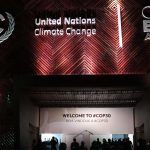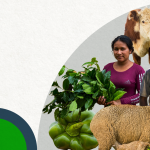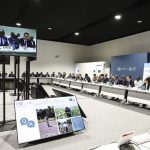COP 29: The Climate Action Platform in Agriculture boosted four strategies to combat climate change
- News
-
Nov 28
- Compartir publicación
The recommendations include promoting efforts to combat climate change and its effects as a state policy, strengthening financing for this purpose, placing small producers at the center, and fostering global partnerships.
November 26, 2024, Baku
A call to countries to enhance efforts to combat climate change and its effects on the agri-food sector was made by the Climate Action Platform in Agriculture of Latin America and the Caribbean (PLACA), where the Food and Agriculture Organization of the United Nations (FAO) serves as the technical secretariat.
During the 2024 United Nations Climate Change Conference (COP29), held in Baku, Azerbaijan, from November 11 to 22, PLACA focused its call on four essential strategies.
Four strategic pillars for combating climate change
Climate action independent of government changes
- Ensure the continuity of agendas and programs aligned with international agreements adopted by the countries in the region, even during government transitions. Regardless of who is in power, it is crucial to maintain focus, as climate challenges require continuous and sustained efforts over time.
Funding with a focus on gender and youth
- Secure the necessary funds to finance climate actions in agricultural activities at the regional level. It is essential to emphasize gender equity and the inclusion of young people: develop financial instruments that promote inclusion and allow these groups to contribute to the transformation of food systems.
Putting small producer families at the center
- Include and empower family farmers in the transition to sustainable food systems, as they represent the backbone of the agri-food sector in the region. For example, there is an urgent need to explore financial mechanisms that include these small producers, facilitating access to resources under affordable conditions and promoting adaptive practices in their productive activities.
Global partnerships
- Integrate PLACA's actions into international frameworks to continue maximizing impact and coordinating climate efforts at the regional and global levels, such as the Alliance for Food and Agriculture for Sustainable Transformation (FAST Alliance), a multi-stakeholder partnership aimed at catalyzing and accelerating the transformation of agriculture and food systems by 2030 for the benefit of people, the climate, and nature.
PLACA at COP 29
The work agenda of PLACA at COP29 was led by authorities like the Minister of Livestock, Agriculture, and Fisheries of Uruguay, Fernando Mattos, who represents PLACA.
"PLACA has made significant progress through a series of impactful initiatives aimed at strengthening regional cooperation and building capacities in climate action," said Uruguay's Minister of Livestock, Agriculture, and Fisheries, Fernando Mattos.
"Through agriculture and food systems, and in initiatives like PLACA, we can promote climate actions that enhance resilience, support adaptation, reduce greenhouse gas emissions, and increase carbon capture while ensuring food security for all," stated Hivy Ortiz, Environmental Improvement Officer at the FAO.
About PLACA
PLACA is a regional initiative launched during COP25. It was created in response to the need for agriculture ministries to have a mechanism that strengthens institutional capacities against the effects of climate change, considering social, environmental, and economic dimensions. It currently has 16 member countries and 5 associated international institutions.
It has contributed to regional cooperation by training over 1,200 technicians and professionals on climate challenges; organizing over 40 training events and technical seminars; publishing sectoral publications; maintaining a web repository with resources, and a bank of practical low-cost solutions for climate action in the Latin America and Caribbean region.
Noticias relacionadas
Cart
- Telegram
- Tumblr
- VKontakte
- Copy link
Suscríbete al Boletín de Noticias
Suscríbete al Boletín de Noticias Semestral de PLACA y recibe información sobre:
Sin spam · Cancela cuando quieras



